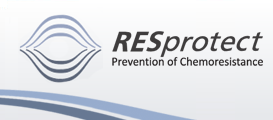| RP101 improves the efficacy of chemotherapy in pancreas carcinoma cell lines |

|

|

|
RP101 improves the efficacy of chemotherapy in pancreas carcinoma cell lines and pancreatic cancer patients.
(Source: Anticancer Drugs.) Full Citation:Anticancer Drugs. 2006 Oct;17(9):1045-1056.
Publisher's Abstract RP101 [(E)-5-(2-bromovinyl)-2'-deoxyuridine (BVDU)], which supports apoptosis and prevents the acquisition of chemoresistance, was tested in cultured human ancreatic tumor cells. RP101 downregulated uridine phosphorylase, a marker of poor prognosis, and APEX1, which is involved in DNA repair, and repressed Stat3 and its target vascular endothelial growth factor. Furthermore, RP101 activated antitumor immunity as demonstrated by enhanced cytolytic activity of NK-92 Natural killer cells. This was concomitant with an enhanced expression of lymphotoxins alpha and beta, natural killer cell transcript 4, tumor necrosis factor LIGHT/TNFSF-14, and intercellular adhesion molecule-1 in pancreas carcinoma cells. These results encouraged us to investigate the effect of RP101 in pancreas cancer patients. Here, we present data from two RP101 combination therapy schemes. In a first pilot study, 13 patients in stage III and VI of the disease were treated with gemcitabine +cisplatin+RP101. RP101 co-treatment enhanced remissions, survival and time to progression. Seventy-seven percent of the patients lived or have lived longer than 1 year, and 23% have lived more than 2 years. Median survival was 447 days, time to progression 280 days and the response rate 33%. A second study with 21 patients in similar stages of disease, treated with RP101+gemcitabine alone, confirmed the results of the pilot study. Eighty-three percent of the presently evaluable patients live or lived 0.5 years or longer and 33% 1 year or longer. Considering both studies, the tumor control was 94%. The data indicate that acquisition of chemoresistance was prevented and the antitumor efficacy of standard chemotherapy was improved. To our knowledge, RP101 co-treatment is more efficient than any other regimen published.
|


